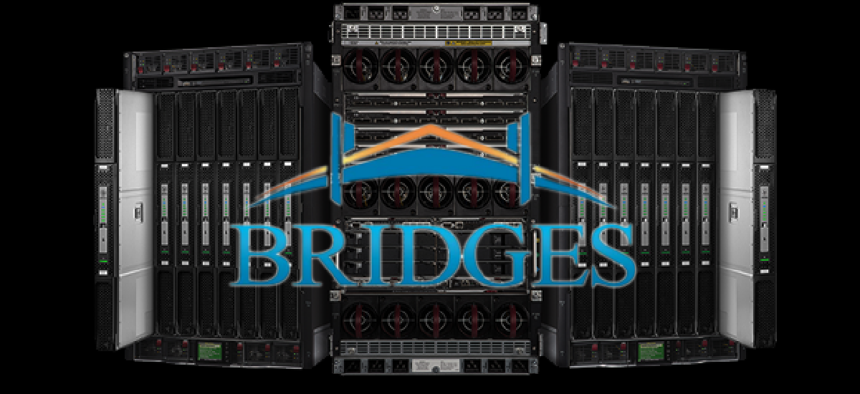Connecting state and local government leaders
Pittsburgh Supercomputing Center's Bridges program gives approved users desktop access to high-performance computing resources through a portal.
A partnership between the Pittsburgh Supercomputing Center and industry is making the processing power of high performance computing available to both traditional and non-traditional HPC users.
PSC teamed with Hewlett Packard Enterprise and Intel for the Bridges project, a National Science Foundation-funded program that gives approved users desktop access to HPC resources through a portal.
“The name ‘Bridges’ stems from three computational needs the system will fill for the research community,” Nick Nystrom, PSC director of strategic applications and principal investigator in the project said when the project was first announced. “Foremost, Bridges will bring supercomputing to nontraditional users and research communities. Second, its data-intensive architecture will allow high-performance computing to be applied effectively to big data. Third, it will bridge supercomputing to university campuses to ease access and provide burst capability.”
Using the portal makes access to Bridges seamless and virtually transparent to users. They prepare and upload their data and submit the jobs to the HPC resources they’ve selected, Nystrom said, and don’t have to log in or understand File Transfer Protocol, for example. Users are granted access by the portal maintainers, who are responsible for allocation.
According to Bill Mannel, vice president and general manager of HPC and big data with Hewlett Packard Enterprise, Bridges is made up of three types of HPE machines:
- Four Integrity Superdome X servers, which are scale-up products that let users lock data once into their 12 terabytes of shared memory and then conduct analytics. This process concentrates memory in one place, rather than having it spread across many nodes.
- 42 HPE ProLiant DL580 servers, each of which has 3 terabytes of shared memory and provides virtualization and remote visualization.
- 800 HPE Apollo 2000 nodes, each with 128 gigabytes of shared memory apiece, servicing capacity workloads.
“All tied together, you’ve got the number crunchers, which are the Apollo 2000s, the data analytics engines in the Superdome, and then you have the 580s that provide the direct access to the whole system from all the users’ workstations or laptops,” Mannel said, "basically giving them access to the supercomputing resources of the center itself."
The system’s composition reflects the workloads Nystrom said he expects Bridges to be used for -- particularly those dealing with big data. “What that lets us do is to converge HPC and big data,” because you have Java and other languages working alongside Spark and Hadoop.
Bridges also has nodes for databases, web services and management as well as three types of storage and memory filesystems. All the components are connected by Intel’s Omni-Path Fabric, a new solution that provides 100 gigabit/sec line speed, low latency and scalability.
Bridges was customized by the Pittsburgh Supercomputing Center with a two-tier topology involving “compute islands” that provide bisection bandwidth communication performance for applications spanning up to 42 nodes and “storage islands” that use the Intel Omni-Path Fabric to implement multiple paths and provide optimal bandwidth to the shared parallel Pylon filesystem, which has 10 petabytes of storage and 180 gigabit/sec bandwidth, according to the Bridges website.
“The point is to have each compute node have multiple paths to storage to avoid congestion and also to give people the maximum performance at the minimum cost,” Nystrom said.
Ninety percent of Bridges is available through NSF’s Extreme Science and Engineering Discovery Environment program, the virtual system that scientists can use to interactively share computing resources, data and expertise.
Access is free to any U.S.-based researchers doing open scientific research, Nystrom said. To apply, researchers must write one of two kinds of proposals. One is a Startup Project Request, which the XSEDE Resource Allocation Committee reviews regularly. The expectation is that a more robust request will follow. The other is a research proposal for projects that are past the startup phase, which the committee reviews quarterly.
The other 10 percent of Bridges’ resources is available through a discretionary pool, Nystrom said. He expects industrial affiliates of PSC to use that.
Bridges is on track to go live in January 2016, although some researchers can access it sooner through the early-user period, Nystrom said.
“I expect that once we start getting all the Bridges hardware online in the next few months, we’ll see people making really good use of it because of the early-user period,” he said.
Bridges received $9.65 million in NSF funding in November 2014. The impetus came from researchers in fields outside those that typically rely on HPC -- such as social sciences -- seeing that they could apply big data tools and technologies to their own research, Mannel said.
Growing interest in big data may have created the opportunity for Bridges, but Nystrom expects the system’s ease of use will really help it take off.
“It presents the user with an interface they’re comfortable with,” he said. “They have their vocabulary, it knows what sort of data they work with, it has their styles of displaying data. It lets them interact with a back-end HPC resource very transparently,” Nystrom explained.
“All they will know is they’re able to get very complicated bits of science done,” Nystrom said. “I think that’s where the real power of this is.”



